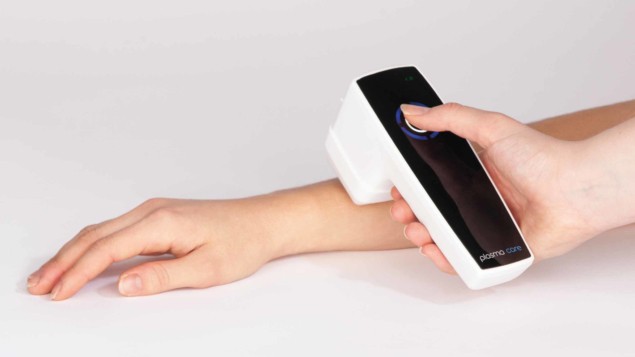Julia Zimmermann, co-founder of the German start-up firm Terraplasma, speaks to Julianna Photopoulos about how a desire to develop applications for cold atmospheric plasmas led her to co-found a family of companies

Plasma, or hot ionized gas, makes up most of the matter in the universe. Consisting of free electrons and positively-charged ions, plasmas have unique properties, such as the ability to generate reactive species, excited atoms and molecules, ultraviolet radiation and electromagnetic fields. Although plasmas are normally very hot, scientists have been able to bring them down to room temperatures and produce these gases at atmospheric pressure, while keeping their properties and allowing them to be used on Earth.
For biophysicist Julia Zimmermann, these high-energy particles sparked a desire to develop various applications for cold atmospheric plasmas. This led her to co-found a family of companies focused on wound treatment, emissions control and more.

Why did you decide to start your first company?
It came out of the scientific work I was doing with my co-founder, Gregor Morfill, at the Max Planck Institute for Extraterrestrial Physics in Garching. I started working on plasma medicine there after doing my degree in physics and my PhD in biophysics, and we worked very hard on evaluating and developing cold atmospheric plasma devices for different applications. It was a very good time because we were able to build up a big group with a lot of scientists, engineers and medical doctors, with funding from the Max Planck Society (MPS).
But the MPS wanted us to do a technology transfer, and there were also companies that wanted to pay us to work for them because we had some patents that they were interested in. So we founded our company, Terraplasma, with the MPS as a shareholder. It wasn’t really an active decision from us scientists. It was just the next step.
What skills did you and your co-founder bring to Terraplasma?
My co-founder is also my dad, so this works quite well! He’s a plasma physicist, and he brings knowledge about cold plasmas, plasma technology and the associated physical theories. I bring knowledge of biophysics and medicine. In addition to my biophysics PhD, I also did my Habilitation in medicine at the Technical University of Munich in the area of cold plasma-based treatments for medical conditions, mainly focusing on wound treatment. So we were able to put together the plasma technology and the theory behind it in different application areas, such as medical technology, hygiene, drinking water treatment, odour management – things that also need biology.
Neither of us had much knowledge about business, so there was a lot of trial and error. You can learn a lot from colleagues, though. After we founded the company, we went into a so-called “founding centre” where you can exchange knowledge with other start-up companies and learn from them and their managing directors.
How has the company changed over the years?
We started with two people and just one room. Although we’re still small, with 12 employees, we now have three indoor labs and an external technical lab. We made some important investments to build up all these labs, so that we can develop prototypes. We also founded two subsidiary companies, Terraplasma Medical and Terraplasma Emission Control, in 2016 and 2018 respectively, after founding the “mother company” in 2011. This was an active decision from our side: we wanted to get investors in, rather than just working in partnership with big companies, as we’re doing at Terraplasma. At Terraplasma Medical, we now have a small mobile device for chronic wound treatments called the plasma care® that is currently undergoing CE certification.
What have been your biggest challenges?
We founded Terraplasma Medical with a company called Dynamify. It has people with knowledge in developing medical devices, we had knowledge in developing cold plasma, so it seemed like it would fit perfectly to build a cold plasma medical device together. The problem was that we didn’t have any money to develop it. We needed €4m, and it’s a big challenge to look for investors if your founders are companies, not individual people. Investors don’t like that. Getting qualified people and keeping them in a small company is also a big challenge.
What do you know now that you wish you’d known before you got started with the company?
To be patient. I’m a very impatient person and I’m learning patience. If I had known how long some things take, it would have made life easier. In science, you need patience with your work, but I think it requires a different kind of patience if you’re waiting for other companies to react or answer. You just can’t do anything to speed up the process. Doing science or development is more fun than waiting for contracts or discussing contracts.
Do you have any advice for somebody who’s just starting their own business?
If you found a company, it’s really important that the basic contracts you’re building it on – your shareholder agreement, statute and investment contract, for example – are set up correctly. That way, you still have a “say” in your business, and it’s clear what will happen if you get investors in who will want to sell the company at some point. But one has to be careful what one signs. If you come from a university, you may not know anything about contracts, except your own employment contract, and for me it was totally new. So my advice is to buy a book and read about contract law because there’s a lot of stuff in that area that one doesn’t understand in the beginning.
if you’re a woman founding a company, just ignore stupid comments from stupid people
Julia Zimmermann
Because we have now founded two daughter companies as well, we know a lot, but it was really “learning by doing”. For the first company, we had some funds to pay our legal costs, but investors have more money and they can hire a lot of lawyers, who of course work to get the best deal for their clients. We were lucky in that we had enough money to get a lawyer who was very good and who was able to explain to me exactly what was in every paragraph of the contract. Otherwise, I wouldn’t have understood it as it’s just not my language. Also, if you’re a woman founding a company, just ignore stupid comments from stupid people. The start-up world is a very male-driven environment and people do say strange things sometimes.



